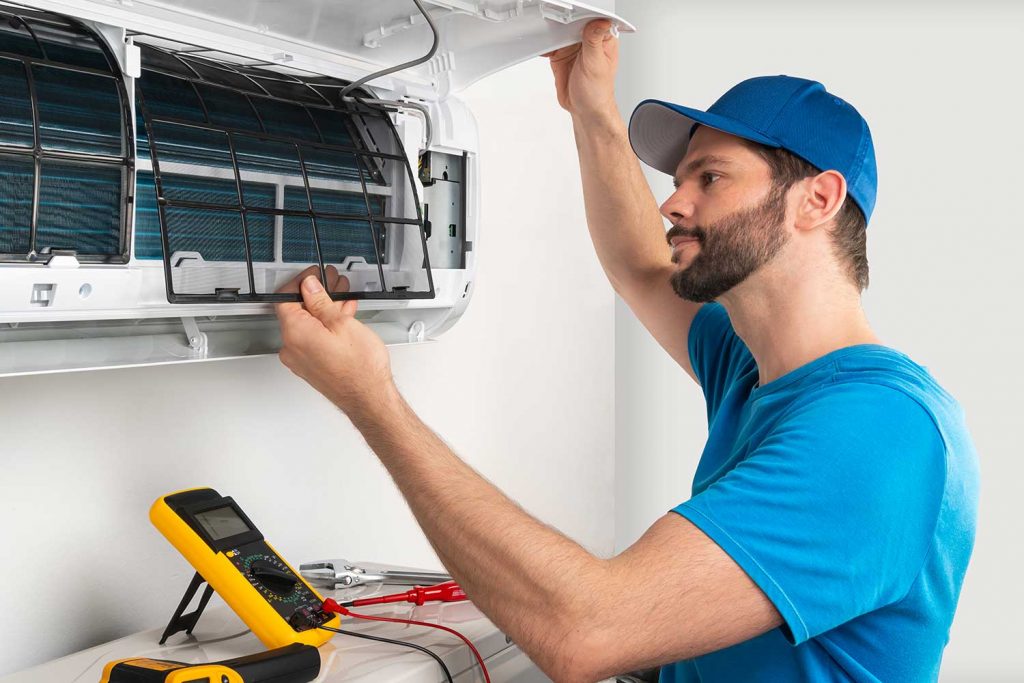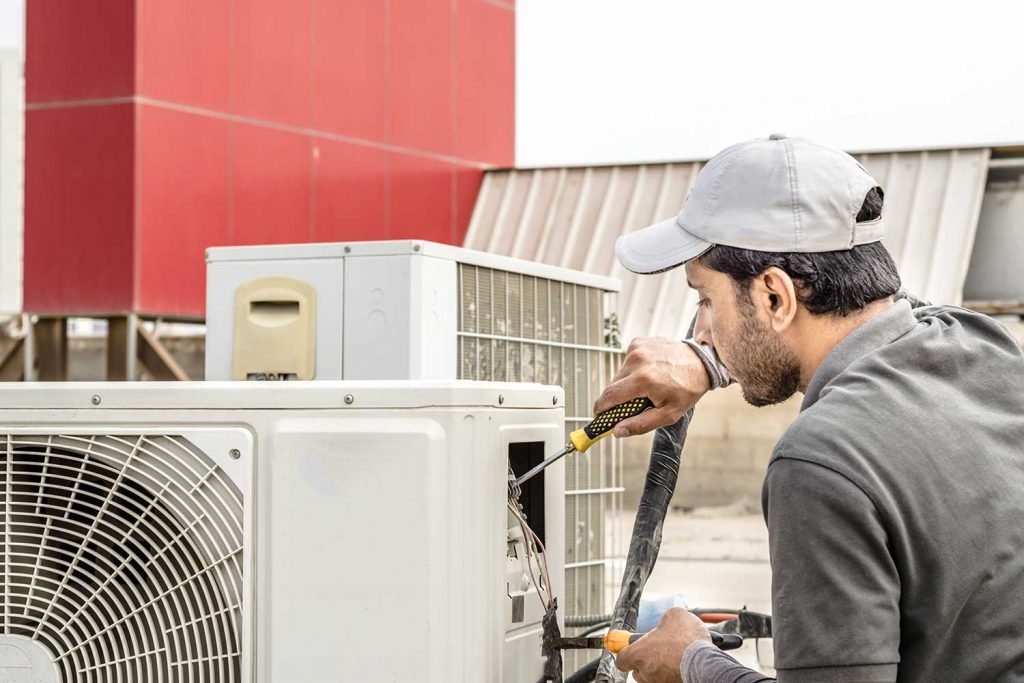When you live in an area where temperatures rise, even if just seasonally, to the upper 80s, 90s, and above, having an HVAC unit can be a lifesaver. A decent HVAC unit can keep your apartment or home cool for several years if properly maintained. But how long does an HVAC unit actually last?
A quality HVAC unit will have a lifespan of anywhere from 10-15 years. There are so many different variables involved that can affect how long a unit will last, primarily including:
- Maintenance
- Unit size and application
- Duct design
- Amount of usage
The long-term impact of each of these things can vary. However, when several of them take place, your HVAC unit may wear down sooner than it should.
There are a few considerations that you should make when purchasing, installing, and maintaining your HVAC unit that can directly affect its longevity. Let’s take a closer look at a few of them.
![Air compressors on a house wall outside, How Long Does An HVAC Unit Typically Last? [And How To Make it Last Longer]](https://hvacseer.com/wp-content/uploads/2020/09/How-Long-Does-An-HVAC-Unit-Typically-Last.jpg)
Factors That Affect The Longevity Of An HVAC Unit
Maintenance

Another major factor that contributes to an HVAC unit’s lifespan is the frequency and quality of its maintenance. Two essential tasks needed to maintain your unit are having a semi-annual servicing and conducting regular filter changes. An HVAC unit can perform optimally if it receives the recommended semi-annual servicing from a licensed HVAC professional.
During this scheduled maintenance, the technician will inspect all system parts and belts, clean the condenser coils, calibrate the thermostat, and check for general wear and tear. Filters should be checked and changed regularly in order to prevent debris from causing plugs that may make the unit’s motor work harder.
Unit Size & Application
The size of the HVAC unit also plays a part in its lifespan. A unit's size affects its efficiency at cooling down a certain amount of space within a room as well as the amount of energy that it uses when turning on and off. A unit that’s too small for its cooling space will need to run more often than a bigger unit in order to maintain the desired room temperature. On the other hand, if a unit is too big for the space, it will require shorter cycles, which can cause premature damage to its coils.
Duct Designs
Having solid, full-functioning ductwork is important in getting the longest amount of usage out of your HVAC unit. If the duct design for your unit is improperly installed or flawed, the extra workload can easily shorten your unit's lifespan causing seals to break and cooled air to leak to unintended parts of your home. It can also have negative effects on other aspects of the unit's operation, including temperature control, energy consumption, and air quality.
Usage
Similar to any other type of home appliance, the amount of usage is going to affect its longevity. While top-quality HVAC units will generally last longer than lower quality models and brands, extensive usage can wear down the parts inside the unit, making it necessary to either replace them or get an entirely new unit (which you’ll get more guidance on later in the post).
How Much Will A New HVAC Save Me?
When conducting research on HVAC units, you’ll often see the term “SEER”, this stands for Seasonal Energy Efficiency Rating. Late-model HVAC units will have a higher SEER rating (typically 13 or more), resulting in more efficient performance and lower electrical costs. If you replace a unit that is 10 years old or more with a newer model, you may potentially save around 15% to 35% on your electricity bills.
Should You Repair Or Replace Your HVAC Unit?

If you’re unsure about whether to replace or repair your HVAC unit, here are a few tips to help guide you to the best decision.
Consider The Cost Of The Repair
Sometimes repairing the unit just isn't worth the money. For example, if you have a unit that's already 12 years old, is it worth replacing the compressor? The average cost of a new HVAC unit, including installation, is around $5,000. If your unit needs frequent repairs and you find that repairing it simply won’t offer the return on investment that a newer unit would in terms of better efficiency and potentially lower electricity costs, it may be time to chuck it.
Creeping Electrical Bills
Large appliances take up the bulk of your residence’s electricity bill. If you begin to notice that your bill is increasing significantly every summer, though you haven’t made any major changes in your cooling habits, an outdated HVAC unit may be the culprit. If this is so, perhaps you should consider investing in a more efficient unit--the money that you could potentially save on your electrical bill will be worth it.
Does It Use Freon?
If your HVAC unit uses Freon as its coolant and it needs significant or costly repairs, it may be time to replace it. As of 2020, Freon has been phased out by the Environmental Protection Agency due to its toxicity and negative effects on the environment (not to mention that it was really expensive). Most newer HVAC units use Puron (aka "R410A").
Availability Of HVAC Unit Parts
When considering replacing parts on an older HVAC unit, it's important to note that these parts may be particularly hard to find and/or more expensive. If a dated part fails on your unit, it may be a good idea to opt for a newer model, especially if the part has failed before.
How Do You Know If You HVAC Is Still Under Warranty?
It’s comforting to know that your HVAC unit is still under warranty when it malfunctions. But what if you’re unsure of whether or not it is still under the warranty? Don’t fret. Here are a couple of ways that you can find the warranty details for your unit.
Check Your Registration
Today, most brands require you to register your HVAC unit online, over the phone, or via mail in order for it to be under warranty. If you can’t remember how you registered your unit, you should be able to contact the HVAC company that installed it in order to retrieve this information. You can also check on the brand’s website for warranty registration details.
Check the Warranty Sticker
You can also find your warranty information by checking the data sticker on your unit. If you take a look at your unit, on it somewhere you'll find a sticker that contains its model or serial number. The sticker is usually placed on the backside of the unit close to the coolant tubes and refrigerant valves.
It's also commonly placed on the corner post of the HVAC unit. Once you locate the model and serial number for your unit, jot down these details or take a picture of the sticker. Next, contact your HVAC dealer or go to their website to look up the warranty details for your model.
What Are The Most Reliable HVAC Brands?
Rheem
The Rheem brand is one of the top brands in the HVAC industry. Rheem is known for manufacturing super-efficient HVAC units with superior warranties. With prices typically ranging in the middle, their HVAC units are a good choice for people looking for great high-quality units without breaking the bank. Rheem also offers a 10-yr warranty on their air compressors as well as other parts of the cooling unit, given you register your HVAC unit within 90 days of purchase.
Carrier
Carrier brand has been a leader in the HVAC industry for quite some time and is one of the most reputable brands in the market. Carrier's HVAC units are manufactured with strict quality standards and are available to both residential and commercial customers. They also have a 10-yr warranty on their units. In comparison to other HVAC manufacturers, Carrier systems are generally less expensive to repair.
Lennox
When it comes to offering energy-efficient HVAC systems, Lennox is definitely a top contender. They've been around since 1895 and have been one of the biggest innovators in the HVAC space. Their units rely on Quantum Coil Technology which allows them to offer a longer lifespan and high performance. Lennox's units come with a 5-yr warranty on parts and components, however, some models come with a 10-year warranty.
Trane
The Trane brand is definitely one of the best brands to consider when it comes to HVAC units. They manufacture their own coils and compressors in order to offer superb efficiency and unit reliability. Their air conditioners are extremely popular with commercial HVAC customers. Trane's units have a very distinctive and sleek design which makes them stand out from other brands. All of their HVAC units come with the industry-standard 10-yr warranty on parts and labor. However, they also include a 12-yr compressor warranty on their units. Trane's units tend to be more expensive to repair and a bit pricier overall when compared to other top HVAC brands.
In Closing
Hopefully this guide has provided you with helpful information regarding the lifespan of a typical HVAC as well as the factors that affect it. You'll also be able to make a more informed decision on which HVAC unit to purchase next, if the need arises.
